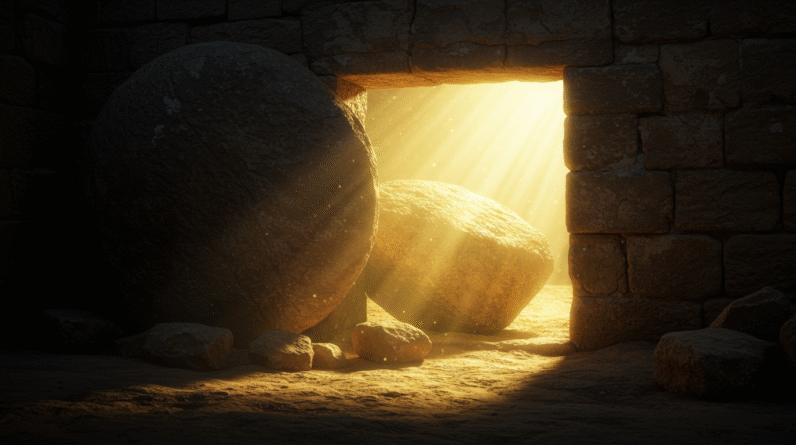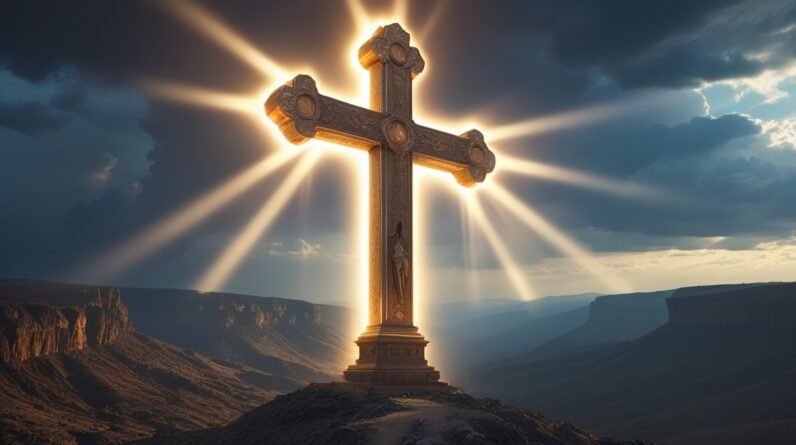while not directly imitating his exact voice. Below is the article written in that high-level style.
The Death Of Jesus: Why The Cross Is The Center Of Our Faith
You may have stood before a cross and felt a rush of emotion—reverence, sorrow, gratitude. The Death of Jesus is more than a tragic event; it is the turning point of human history. When you consider the cross, you are looking at the place where God met human need, where justice and mercy met, and where the story of redemption unfolded. The cross is central because everything the gospel promises—forgiveness, reconciliation, new life—flows from what happened there.
Introduction: The Central Claim of the Gospel
When you hear the word gospel, you are hearing the good news that God has acted in Jesus Christ for your salvation. The Death of Jesus is the heart of that good news. Paul put it plainly: “Christ died for our sins” (see 1 Corinthians 15:3-4). The cross is not secondary ornamentation on the Christian life; it is the very event that makes reconciliation with God possible. If you want to understand the Christian faith, you must begin here—with the cross, the empty tomb, and the risen Lord who conquered death.
What Happened at the Cross?
You can read the Gospel accounts and feel the drama: the betrayal, the trial, the crucifixion, the darkness, the cry, and then the stillness. The Death of Jesus was not a distant myth; it was a real historical event with cosmic significance. Matthew records the lamentation and the signs: darkness over the land and the temple veil torn in two at the death of Jesus (Matthew 27:45-54). The Gospels give you the human details and the divine weight of that day.
The Physical Death
You may think first of the physical suffering: scourging, mocking, and the slow, excruciating death of crucifixion. John captures Jesus’ final words—”It is finished”—a statement both of completion and triumph (John 19:30). Luke records the final cry and Jesus’ entrusting of his spirit to the Father (Luke 23:46). The physical reality of Jesus’ death underscores that God did not send a distant substitute; the Son entered fully into human pain and death.
The Spiritual Dimensions
You must also see the spiritual meaning. Isaiah spoke centuries earlier of a suffering servant who would bear our griefs and carry our sorrows (Isaiah 53:4-6). In the New Testament, the apostles connect that prophecy to the Death of Jesus. The cross was not merely an execution; God planned to take sin’s penalty upon Himself so you could be freed. Paul explains that God presented Christ as a sacrifice of atonement to demonstrate His righteousness and to offer forgiveness (Romans 3:25).
Theological Meanings of the Death of Jesus
When you study the Death of Jesus, theological words come to the surface—atonement, reconciliation, redemption, and propitiation. These are not just jargon; they describe how God accomplishes your salvation. Each term focuses on an aspect of the great work done on the cross.
Substitution and Atonement
You need to understand substitution: Jesus died in your place. Paul says that Christ died for the ungodly and for sinners (Romans 5:6-8). The apostle Peter tells you that “He himself bore our sins in his body on the tree” (1 Peter 2:24). This is not a metaphysical abstraction; it is the terrifyingly real exchange—your sin against His righteousness—so that you might be declared right with God.
Reconciliation and Adoption
You are reconciled to God through the Death of Jesus. Sin had created a gulf between you and God, but through Christ’s sacrificial death, the enmity is removed. Paul writes that through Christ, God was reconciling the world to Himself (2 Corinthians 5:18-19). Reconciliation leads to adoption; through Jesus, you are given a new status—no longer a slave to sin but a child of God, able to cry out, “Abba, Father” (Romans 8:15-17).
Victory Over Sin and Death
The Death of Jesus is not the final word; it is the decisive blow against sin and death. Paul says that God raised Jesus from the dead, and in doing so, defeated the powers that held humanity in bondage (1 Corinthians 15:3-4). Colossians declares that God made you alive with Christ, forgiving you all your trespasses (Colossians 2:13-15). The cross and the resurrection together show that death is not the end and that God has the final victory.
Why the Cross Is Central to Christian Faith
You may wonder why other aspects of Christ’s life—His teaching, His miracles, His compassion—are not enough. They are essential, of course, but the cross is the hinge on which God’s plan turns. Without the Death of Jesus, forgiveness remains unaccomplished, the demands of justice unmet, and the path to reconciliation closed.
The Cross as the Gospel’s Core
Paul told the Corinthians that he resolved to know nothing among them except Jesus Christ and Him crucified (1 Corinthians 2:2). The message of the cross is foolishness to those without faith but the power of God to you who are being saved (1 Corinthians 1:18). The cross is not a philosophical point; it is the declaration that God has acted to save sinners.
The Cross and Personal Transformation
When you grasp what happened at Calvary, it changes how you live. Paul says you were baptized into Christ’s death and raised to walk in newness of life (Romans 6:3-4). The Death of Jesus calls for a response that touches every area of life: your decisions, your relationships, your priorities. To follow Christ is to take up a cross and follow Him (Luke 9:23).
Common Questions About the Death of Jesus
You are not alone if you wrestle with questions about the Death of Jesus. Many have asked: Why did God allow His Son to suffer? Couldn’t God have forgiven without such a price? How does this relate to justice? These are honest, important queries you should bring to Scripture.
Why Did Jesus Have to Die?
The Bible’s answer is not complicated but solemn: sin requires a penalty. “The wages of sin is death” (Romans 6:23). Because God is holy, sin cannot simply be overlooked. But out of love, God provided a way: His own Son took the penalty upon Himself so that you might receive life. As Paul explains, God demonstrates His love for you in that while you were still a sinner, Christ died for you (Romans 5:8).
Could God Have Forgiven Without the Cross?
You might imagine a world where God simply forgives without any atoning action. But forgiveness in Scripture is bound up with divine justice and the seriousness of sin. Hebrews tells you that without the shedding of blood there is no forgiveness (Hebrews 9:22). The cross reveals that God is both just and the justifier of the one who has faith in Jesus (Romans 3:26). At the cross, justice is satisfied and mercy poured out.
The Role of Human Sin and Responsibility
You must not offload all responsibility for the Death of Jesus onto abstract divine necessity; human choices matter. The Gospels show human agents—Judas, the religious leaders, and Pilate—playing roles in the events. Peter, looking back, said that Jesus was handed over according to God’s definite plan, yet he also said those who crucified Him acted in ignorance and wickedness (Acts 2:23). The mystery is that God accomplishes His redemptive purpose without negating human responsibility.

How You Respond to the Death of Jesus
When you understand the Death of Jesus, it demands a decision. The gospel is not just information—it is an invitation. Scripture calls you to repent, believe, and be baptized. This is the way you enter into the reality that Christ purchased on the cross.
Repentance and Faith
Peter’s message on the day of Pentecost was clear: repent and be baptized in the name of Jesus Christ for the forgiveness of your sins (Acts 2:38). To repent means to turn from sin and to turn to God. Faith means trusting in the Death of Jesus as the sufficient and finished payment for your sins. Paul explains that if you confess with your mouth that Jesus is Lord and believe in your heart that God raised Him from the dead, you will be saved (Romans 10:9-10).
Living in the Light of the Cross
Once you have embraced the cross, your life will reflect it. You are urged to offer your body as a living sacrifice—holy and pleasing to God (Romans 12:1). Paul describes Christian identity in terms that flow from the cross: “I have been crucified with Christ and I no longer live, but Christ lives in me” (Galatians 2:20). The cross shapes your ethics—love your enemies, forgive as you have been forgiven, carry each other’s burdens.
The Cross in Worship and Practice
You will find the cross woven into the life of the church—in preaching, sacraments, and prayer. Worship is not merely sentimental; it is grounded in remembrance. When you take the Lord’s Supper, you remember the Lord’s death until He comes (1 Corinthians 11:23-26). The cross is the center of Christian worship because it is the center of God’s work for you.
Communion and Remembrance
Jesus instituted the Supper as a memorial of His broken body and shed blood—symbols that point you back to the Death of Jesus and forward to His return. When you eat the bread and drink the cup, you proclaim the Lord’s death until He comes (1 Corinthians 11:26). This practice keeps your heart anchored in the gospel.
Proclamation and Preaching
Paul insisted that the church’s message is “Christ crucified” (1 Corinthians 1:23). When you gather, the Word that centers on the cross transforms you. Preaching that refuses to speak of the Death of Jesus is a preaching that fails to preach the gospel. The cross shapes every sermon that calls sinners to repentance and faith.
Comfort and Hope from the Cross
If you are burdened by guilt, grief, or suffering, the cross offers you comfort. There is forgiveness for your sin, and there is a Savior who knows your pain. He bore our infirmities and carried our sorrows (Isaiah 53:4). In the cross you find both compassion and power.
The Cross in Suffering
When you suffer, you are not alone. Jesus, who tasted death, sympathizes with your weakness (Hebrews 4:15-16). Paul, writing from prison, could say that the sufferings of this present time are not worth comparing with the glory to be revealed (Romans 8:18). The cross assures you that suffering is not meaningless; God can use it to shape you into Christlikeness (Romans 8:28).
The Promise of Resurrection
The Death of Jesus points you to the empty tomb. Because Christ died and rose, you have the hope of resurrection. Paul declares that Christ has been raised as the firstfruits of those who have fallen asleep (1 Corinthians 15:20-22). The cross and the resurrection together guarantee that your final state is not despair but eternal life with God.
The Cross and Daily Discipleship
You do not just believe in the cross once and then live as if nothing changed. Daily discipleship is a life formed by the Death of Jesus. In the daily grind—work, family, struggles—you are called to reflect what the cross has done in you.
Denial, Service, and Sacrifice
Jesus taught that following Him involves self-denial. To be His disciple, you must take up your cross daily (Luke 9:23). That means you will serve, sacrifice, and sometimes suffer for righteousness’ sake. Yet this path is not empty; it leads to life that is rich in purpose and anchored in God’s promises.
Witness and Mission
The Death of Jesus compels you to tell others. You are entrusted with the message that God reconciled the world to Himself through Christ (2 Corinthians 5:18-20). Your life of witness—words and deeds—carries the aroma of Christ to those around you. In sharing the gospel, you participate in the ongoing mission that flows from the cross.
The Cross and the Church
You belong to a community that revolves around the cross. The church exists to make the cross known, to worship the crucified and risen Lord, and to live out the implications of His death and resurrection.
Unity and Humility
The Death of Jesus calls the church to unity and humility. Paul urged believers to be of the same mind, bearing one another’s burdens (Philippians 2:1-4). The cross is a great equalizer: all are sinners in need of grace, and all are recipients of mercy. In the church, you find a home where forgiveness is not only proclaimed but practiced.
Mission and Sacrifice
The church is sent into the world to be salt and light because of what happened on the cross. The Death of Jesus not only saves you; it empowers the church to serve the world sacrificially. As you participate in the church’s mission, you live out the cross-shaped love that Jesus demonstrated.
A Final Appeal: How You Can Know the Power of the Cross
If you have never trusted Christ, the Death of Jesus is the starting point for your new life. The Bible tells you precisely how to respond: confess Jesus as Lord, believe in your heart that God raised Him from the dead, and you will be saved (Romans 10:9-10). If you sense God drawing you, do not harden your heart. Turn to Him in faith and receive the gift of forgiveness.
If you already follow Christ, let the cross shape everything you do. Remind yourself daily that you were bought with a price (1 Corinthians 6:20). Live in gratitude, serve with humility, and proclaim the good news with boldness.
Conclusion: The Cross as the Anchor of Hope
You stand before the cross and see both justice and mercy, suffering and love, death and the promise of life. The Death of Jesus is the center of our faith because it is where God accomplished what you could not—He dealt with sin, satisfied righteousness, and opened the way to reconciliation. The empty tomb proves the effectiveness of the cross. In the death and resurrection of Jesus, you find pardon for your past, power for your present, and hope for your future.
If your heart is moved by the cross today, bow in prayer. Tell God you recognize your need, ask for forgiveness, and commit to follow Jesus. He stands ready to receive you with open arms.
Explore More
For further reading and encouragement, check out these posts:
👉 7 Bible Verses About Faith in Hard Times
👉 Job’s Faith: What We Can Learn From His Trials
👉 How To Trust God When Everything Falls Apart
👉 Why God Allows Suffering – A Biblical Perspective
👉 Faith Over Fear: How To Stand Strong In Uncertain Seasons
👉 How To Encourage Someone Struggling With Their Faith
👉 5 Prayers for Strength When You’re Feeling Weak

📘 Jesus and the Woman Caught in Adultery – Grace and Mercy Over Judgement
A powerful retelling of John 8:1-11. This book brings to life the depth of forgiveness, mercy, and God’s unwavering love.
👉 Check it now on Amazon
As a ClickBank & Amazon Affiliate, I earn from qualifying purchases.
Acknowledgment: All Bible verses referenced in this article were accessed via Bible Gateway (or Bible Hub).
“Want to explore more? Check out our latest post on Why Jesus? and discover the life-changing truth of the Gospel!”






